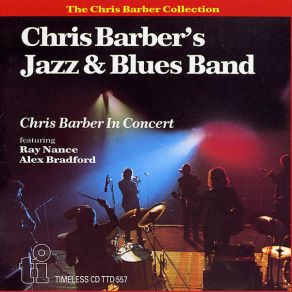Chris Barber In Concert
Download links and information about Chris Barber In Concert by The Blues Band. This album was released in 1956 and it belongs to Blues, Jazz genres. It contains 12 tracks with total duration of 01:07:58 minutes.

|
|
|---|---|
| Artist: | The Blues Band |
| Release date: | 1956 |
| Genre: | Blues, Jazz |
| Tracks: | 12 |
| Duration: | 01:07:58 |
| Buy it NOW at: | |
| Buy on iTunes $9.99 | |
| Buy on Amazon $8.99 | |
Tracks
[Edit]| No. | Title | Length |
|---|---|---|
| 1. | Take the "A" Train, Pt. 1 (Live) | 5:54 |
| 2. | Just A-Sittin' and A-Rockin' (Live) | 4:26 |
| 3. | Blues for Yesterday (Live) | 4:25 |
| 4. | Summertime (Live) | 8:14 |
| 5. | Oh, Lady Be Good (Live) | 5:34 |
| 6. | When You're Smiling (Live) | 3:20 |
| 7. | Take the "A" Train, Pt. 2 (Live) | 0:52 |
| 8. | Just a Closer Walk With Thee (Live) | 7:20 |
| 9. | Lord, Lord, You've Sure Been Good to Me (Live) | 5:13 |
| 10. | Shady Green Pastures (Live) | 6:39 |
| 11. | Introduction By Alex Bradford: They Kicked Him Out of Heaven (Live) | 6:56 |
| 12. | Introduction By Alex Bradford: Precious Lord, Take My Hand (Live) | 9:05 |
Details
[Edit]Recorded live at the Royal Festival Hall in London on December 15, 1956, this captures the early Barber band in its prime, although Lonnie Donegan had been replaced on banjo by Eddie Smith about nine months prior to this date. The sound is quite good for a 1956 concert recording, and in fact there's a certain crispness and liveliness to both the acoustics and the performances that make this in some ways preferable to their rather starchier studio recordings of the same era. While Dixieland-type jazz is given the most prominence, some piano-anchored bluesier arrangements supply a nice change of gear, as do Ottilie Patterson's vocals on "Mean Mistreater" and "Lowland Blues." And if the blues guitar solo on "Lowland Blues" (presumably by extremely short-term member Johnny Duncan) is especially weedy and feeble, well, at least it was a start as a twig that would eventually blossom into a huge influence on British rock and popular music. Other members of the band take vocals on "Bourbon Street Parade" (which would become Barber's standard set opener) and "Old Man Mose," and though they could hardly pass as the singing of actual New Orleans jazzmen, there's a certain British chirpiness to the delivery that makes them kind of fun to hear.